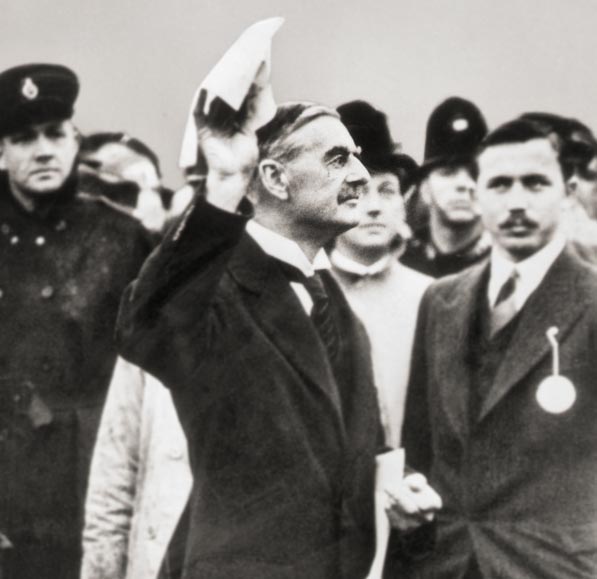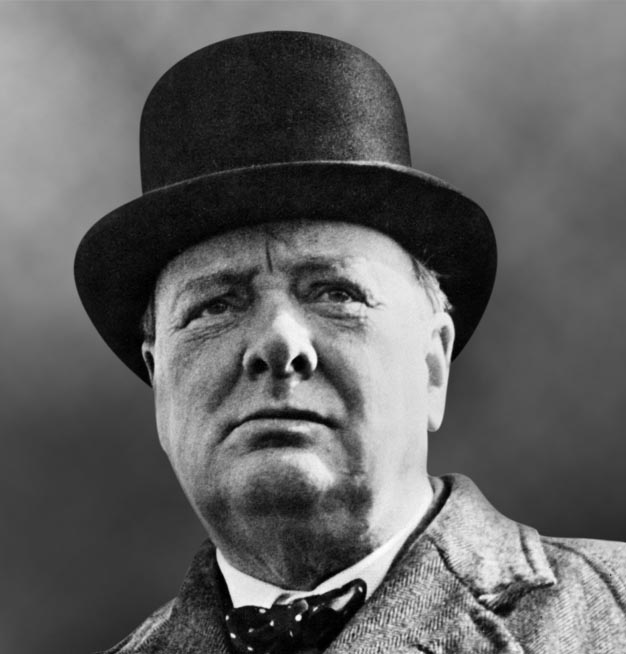
IN CONTEXT
Conservatism
Non-appeasement
c.350 BCE Statesman and orator Demosthenes criticizes his fellow Athenians for not anticipating Philip of Macedon’s imperial goals.
1813 European powers try to settle with Napoleon, but his renewed military campaigns drive a coalition of allies to defeat him at Leipzig.
1982 British prime minister Margaret Thatcher refers to Chamberlain when urged to compromise with Argentina during the Falklands War.
2003 US president George Bush and British prime minister Tony Blair invoke the dangers of appeasement in the run-up to the Iraq War.
In the mid-1930s the word “appeasement” had not yet taken on the taint of cowardice and ignominy that later events would give it. Conciliatory policy making had become the norm after World War I, as European powers sought to ease what Winston Churchill had called “the fearful hatreds and antagonisms which exist in Europe.” But as the Great Depression took its toll around the world and Adolf Hitler rose to power in Germany, Churchill and a very few others saw that this policy was becoming dangerous. Defense expenditure in Britain had been greatly constrained by the economic slump. The need to rearm against Hitler came at a time of extreme financial duress for a nation that was still struggling to recover from the Great War and deploying most of its military resources in the remote outposts of the British empire. The idea of confronting Germany again to contain Hitler was dismissed by conservative prime minister Stanley Baldwin and his successor, fellow conservative Neville Chamberlain. Assuaging the dictator’s mounting grievances seemed to them the moderate, practical approach.

"You were given the choice between war and dishonor. You chose dishonor and you will have war."
Winston Churchill
Churchill’s unofficial network of military and government intelligence kept him informed about Nazi aims and movements and the unprepared state of British forces. He warned Parliament about Hitler’s intentions in 1933, and continued to raise the alarm in speeches of immense poetic power in the face of what he saw as complacency, only to be mocked as a warmonger and relegated to the back benches of Parliament.
The Munich Agreement
The appeasement mindset in British politics was firmly entrenched, and the British offered no resistance to Hitler’s systematic breach of the conditions of the Versailles Treaty they had signed at the end of World War I—including his remilitarization of the Rhineland—or to his legislation against the Jews. Emboldened, Hitler annexed Austria into the Reich in 1938, and in the same year, crudely coerced Chamberlain at Munich to trade Czechoslovakia’s Sudetenland for another false promise of peace.
Hitler was bemused by his easy gains. He had planned to “smash” Czechoslovakia with a “shock and awe”-style entry into Prague and instead found her “virtually served up to me on a plate by her friends.”
Churchill denounced the Munich Agreement. He contended that to feed the Nazi monster with concessions would simply make it more voracious. Other politicians trusted Hitler, and Churchill stood almost alone, among Conservatives at least, in condemning him. He refused at all times to discuss anything at all with Hitler or with his representatives. Radical but reasoned, this non-negotiable defiance of tyranny, to the death if need be, was the core idea that would bring down the Nazis.

Churchill denounced the settlement that Chamberlain negotiated with Hitler at Munich in 1938 as “a total, unmitigated defeat.”
WINSTON CHURCHILL

The son of English lord Randolph Churchill and American heiress Jennie Jerome, Sir Winston Leonard Spencer-Churchill once described himself as “an English-Speaking Union.” He was educated at Harrow Public School and Sandhurst Military Academy and then served in India with a cavalry commission. During the 1890s, he distinguished himself as a war correspondent covering the Cuban Revolt against Spain, British campaigns in India and the Sudan, and the Boer War in South Africa. His career in the House of Commons, first as a Liberal and later as a Conservative, spanned 60 years. He took charge of a government of national unity during World War II, and served one further term as prime minister in 1951. Churchill was a prolific writer and received the Nobel Prize for Literature in 1953, largely for his six-part history of World War II.
Key works
1953 The Second World War
1958 A History of the English Speaking Peoples
1974 The Complete Speeches
See also: Mahatma Gandhi • Napoleon Bonaparte • Adolf Hitler
